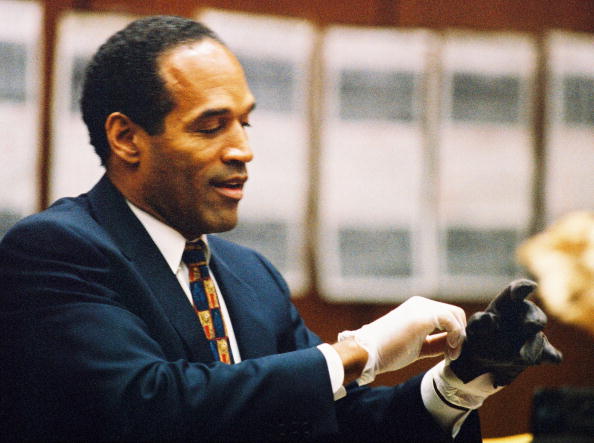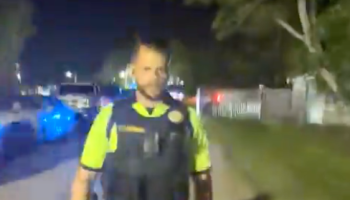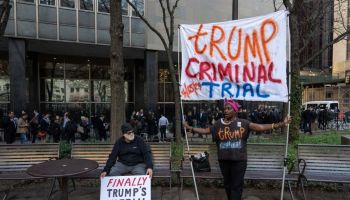GAZA CITY, Gaza Strip – Israel widened its deadliest-ever air offensive against Gaza’s Hamas rulers Sunday, pounding smuggling tunnels and a central prison, sending more tanks and artillery toward the Gaza border and approving a reserves callup for a possible ground invasion.
Israeli leaders said they would press ahead with the Gaza campaign, despite enraged protests across the Arab world and Syria’s decision to break off indirect peace talks with the Jewish state. Israel’s foreign minister said the goal was to halt Gaza rocket fire on Israel for good, but not to reoccupy the territory.
With the two-day death toll nearing 300 Sunday, crowds of Gazans breached the border wall with Egypt to escape the chaos. Egyptian forces, some firing in the air, tried to push them back into Gaza and an official said one border guard was killed.
Hamas, in turn, fired rockets deeper than ever into Israel, near the Israeli port city of Ashdod.
Yet Hamas leaders were forced into hiding, most of the dead were from the Hamas security forces, and Israel’s military intelligence chief said Hamas’ ability to fire rockets had been reduced by 50 percent. Indeed, Hamas rockets fire dropped off sharply, from more than 130 on Saturday to just over 20 on Sunday. Still, Hamas continues to command some 20,000 fighters.
Israel’s intense bombings — some 300 air strikes since midday Saturday — wreaked unprecedented destruction in Gaza, reducing entire buildings to rubble.
After nightfall, Israeli aircraft attacked a building in the Jebaliya refugee camp next to Gaza City, killing a 14-month-old baby, a man and two women, Gaza Health Ministry official Dr. Moaiya Hassanain said. In the southern town of Rafah, Palestinian residents said a toddler and his two teenage brothers were killed in an airstrike aimed at a Hamas commander.
Israeli aircraft also bombed the Islamic University and government compound in Gaza City, centers of Hamas power, and the house next to the residence of Hamas Prime Minister Ismail Haniyeh in a Gaza City refugee camp. Haniyeh, in hiding, was not home.
Shlomo Brom, a former senior Israeli military official, said it was the deadliest force ever used in decades of Israeli-Palestinian fighting. “Since Hamas took over Gaza (in June 2007), it has become a war between two states, and in war between states, more force is used,” he said.
European leaders called on both Israel and Hamas to end the bloodshed.
French President Nicolas Sarkozy spoke Sunday with Palestinian President Mahmoud Abbas, who leads a rival government to Hamas in the West Bank, and condemned “the provocations that led to this situation as well as the disproportionate use of force.”
The White House was mum about the situation in Gaza on Sunday after speaking out expansively on Saturday, blaming Hamas for provoking Israel’s retaliatory strikes.
In the most dramatic attacks Sunday, warplanes struck dozens of smuggling tunnels under the Gaza-Egypt border, cutting off a lifeline that had supplied Hamas with weapons and Gaza with commercial goods. The influx of goods had helped Hamas defy an 18-month blockade of Gaza by Israel and Egypt, and was key to propping up its rule.
Sunday’s blasts shook the ground several miles away and sent black smoke high into the sky. Earlier, warplanes dropped three bombs on one of Hamas’ main security compounds in Gaza City, including a prison. Moments after the blasts, frantic inmates, their faces dusty and bloodied, scrambled down the rubble. One man, still half buried, raised a hand to alert rescuers.
Gaza’s nine hospitals were overwhelmed. Hassanain, who keeps a record for the Gaza Health Ministry, said more than 290 people were killed over two days and more than 800 wounded.
The Palestinian Center for Human Rights, which keeps researchers at all hospitals, said it had counted 251 dead by midday Sunday, and that among them were 20 children under the age of 16 and nine women.
Across Gaza, families pitched traditional mourning tents of green tarp outside homes. Yet the rows of chairs inside these tents remained largely empty, as residents cowered indoors for fear of new Israeli strikes.
Israeli leaders gave interviews to foreign television networks to try win international support.
Public Security Minister Avi Dichter, speaking Arabic, spoke on Arab satellite TV stations, denouncing Hamas rule in Gaza. And Foreign Minister Tzipi Livni told NBC that the assault came because Hamas, an Islamic group backed by Syria and Iran, is smuggling weapons and building a “small army.”
In Jerusalem, Israel’s Cabinet approved a callup of 6,500 reserve soldiers, raising fears of an impending ground offensive. Israel has doubled the number of troops on the Gaza border since Saturday and also deployed an artillery battery. It was not clear, though, whether the deployment was meant to pressure Hamas or whether Israel is determined to send ground troops.
Israeli Prime Minister Ehud Olmert said it was unclear when the operation would end but told his Cabinet was “liable to last longer than we are able to foresee at this time.”
Since Israel’s withdrawal from Gaza in 2005, after 38 years of full military occupation, Israeli forces have repeatedly returned to the territory to hunt militants. However, Israel has shied away from retaking the entire strip, for fear of getting bogged down in urban warfare.
The diplomatic fallout, meanwhile, was swift.
Syria decided to suspend indirect peace talks with Israel, begun earlier this year, and the U.N. Security Council called on both sides to halt the fighting and asked Israel to allow humanitarian supplies into Gaza; 30 trucks were let in Sunday.
U.N. Secretary-General Ban Ki-moon called on Israel to open its crossings “for the continuous provision of humanitarian supplies.” In a statement, he said one Palestinian U.N. employee, and eight trainees, were among the dead.
The prime minister of Turkey, one of the few Muslim countries to have relations with Israel, called the air assault a “crime against humanity.”
The carnage inflamed Arab and Muslim public opinion, setting off street protests across the West Bank, in an Arab community in Israel, in several Middle Eastern cities and in Paris.
Some of the protests turned violent. Israeli troops quelling a West Bank march killed one Palestinian and seriously wounded another. A crowd of anti-Israel protesters in the northern Iraqi city of Mosul became a target for a suicide bomber on a bicycle. In Lebanon, police fired tear gas to stop demonstrators from reaching the Egyptian Embassy.
Egypt, which has served as a mediator between Israel and the Palestinians as well as between Hamas and its rival Fatah, has been criticized for joining Israel in closing its borders with Gaza. The blockade was imposed after the Hamas takeover in June 2007.
Egyptian Foreign Minister Ahmed Aboul Gheit called on Hamas to renew its truce with Israel. The cease-fire began unraveling last month, and formally ended more than a week ago. Since then, Gaza militants had stepped up rocket fire on Israel.
A Hamas leader in exile, Osama Hamdan, said the movement would not relent. “We have one alternative, which is to be steadfast and resist and then we will be victorious,” Hamdan said in Beirut.
Also in Beirut, Hassan Nasrallah, leader of the Hezbollah militia, said he would not abandon Hamas, but did not threaten to attack Israel. During the Israel-Hezbollah war of 2006, the militia fired thousands of rockets into Israel.
Hundreds of thousands of Israelis live in cities and towns in Gaza rocket range, and life slowed in some of the communities. Schools in communities in a 12-mile radius from Gaza were ordered to remain closed beyond the weeklong Jewish holiday of Hanukkah, which ends Monday.
In the southern city of Ashkelon, home to some 120,000 people, streets were relatively busy, despite the military’s recommendations against being out in the open.
Several times throughout the day, however, that routine was briefly interrupted by the sounds of wailing sirens warning of an imminent attack. Pedestrians scurried for cover in buildings. After a number of rocket landed in the distance, a woman taking cover nearby briefly fainted. She refused water and food from bystanders, instead shivering in a corner, apparently in shock.
















